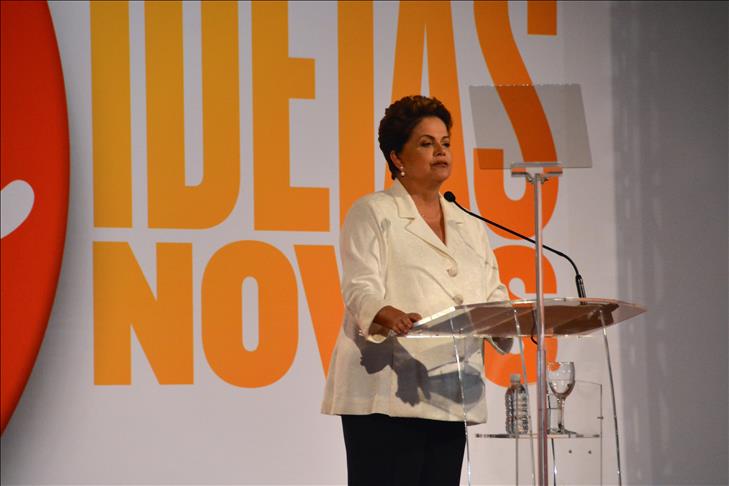Economy, corruption key to Brazil presidential runoff
A tight second-round in the presidential race is expected with the economy and corruption set to be at the heart of accusations, experts tell The Anadolu Agency.

By Ben Tavener
SAO PAULO
The remaining two candidates in the presidential race met with campaign teams Monday to plan negotiations to redraw political battlelines and secure rivals' supports ahead of the Oct. 26 runoff.
Sunday's first-round vote saw incumbent and leftist Workers' Party candidate President Dilma Rousseff take 41.5 percent of valid votes, but center-right Brazilian Social Democracy Party candidate and market favorite Aécio Neves performed unexpectedly well, finishing in second with 33.6 percent, forcing a fourth consecutive runoff between the two parties.
Former environment minister Marina Silva, running for the Brazilian Socialist Party (PSB), placed third with 21 percent of support, meaning elimination from the race. Pre-election polls suggested Neves had overtaken Silva only on the eve of the vote, however, with just three weeks until the second round, and with campaigning officially allowed to restart Monday evening, there is now considerable anxiety in both camps over who Silva and the PSB will now publicly support.
Political scientist Carlos Pereira, at the private university Fundação Getúlio Vargas, says the economy and corruption will take an even more central role in a hotly-fought, uncertain second round between the two polarized candidates.
"Rousseff comes with a robust and inclusive package of social programs popular with many voters, but is less concerned with macroeconomic stability, inflation and economic growth, a choice that will be unsustainable over time," Pereira told The Anadolu Agency (AA).
"While voters know the Social Democracy party can likely provide macroeconomic stability, Neves has to convince the electorate he can bring growth without posing a threat to those social programs."
Rousseff will likely emphasize this threat in the second round, but Neves will accuse Rousseff of stifling the economy, Pereira believes.
The economy has slowed drastically under Rousseff's rule and with expected GDP growth below 1 percent this year, the markets have clearly sided with Neves, who won by a large majority in São Paulo, Brazil's most populous state and economic heartland.
The highly-uncertain climax to the first round had a negative effect on the markets and Brazil's currency, the real, which lost considerable ground to the U.S. dollar.
But markets reacted positively to news of a second round between Rousseff and Neves after most pre-election polls suggested he would be eliminated.
São Paulo's Bovespa stock exchange jumped 8 percent after opening Monday, and was still up around 5 percent at 2:45 p.m. local time (1745GMT). The U.S. dollar also was down against the real 1.6 percent, buying 2.418 reais, after strengthening considerably in the last week of first-round campaigning. Last Thursday it bought 2.495 reais.
Camila Abdelmalac, an economist at CM Capital Markets in São Paulo, told AA that the markets had been buoyed by the security of knowing that Neves was in the final race.
"We have seen a very positive response from the markets, partly because pro-business Aécio Neves is in the final two, but also because the Workers' Party advantage is now much lower than it was in previous elections. The markets interpret this as meaning the electorate wants change."
"But the race is going to be tight: while many of Silva's supporters are expected to side with Neves, some are more aligned with Rousseff's politics. The markets are waiting for clearer signals on that," Abdelmalac said.
Aside from politics, corruption is also bound to be raised in the second-round campaign, which analysts say is likely to see a heated crossfire of claims and counterclaims.
Pereira says further revelations on a kickback scheme allegedly operated on contracts at the country's state-run oil giant Petrobras could damage Rousseff, as many of her allies have been implicated by former director Paulo Roberto Costa, currently under investigation for his role, as part of a plea bargain for a reduced sentence.
Allegations to date have come through media sources leaking the contents of the plea bargain in which Costa is reported to have named more than 40 senior political figures, including a minister in Rousseff's government.
Members of other parties are also alleged to be involved, and Rousseff, who was a member of the Petrobras board of directors and denies all knowledge of the scheme, has not been personally implicated, although her presidential rivals argued she bore "political responsibility" for the case.
Neves has also been accused of corruption in recent months. an airport was alleged to have been built with $5.5 million of public money on land belonging to an uncle in Neves' home state of Minas Gerais, while he was state governor. He denies the allegations.
Accusations of corruption have so far appeared to have little effect on the candidates' popularity.
Anadolu Agency website contains only a portion of the news stories offered to subscribers in the AA News Broadcasting System (HAS), and in summarized form. Please contact us for subscription options.





